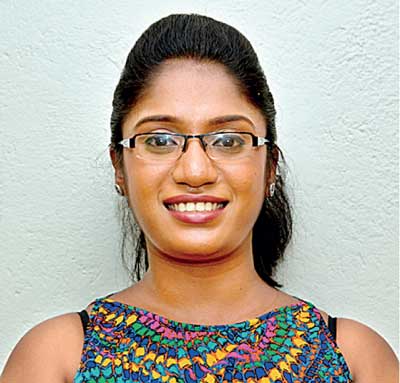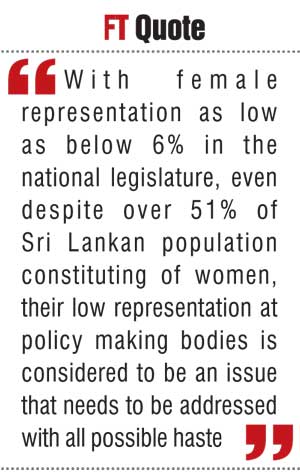Saturday Feb 21, 2026
Saturday Feb 21, 2026
Thursday, 10 December 2015 00:00 - - {{hitsCtrl.values.hits}}
By Chapa Perera
The topic of increasing female representation in the Sri Lankan political arena is subjected to much interesting debate. With female representation as low as below 6% in the national legislature, even despite over 51% of Sri Lankan population constituting of women, their low representation at policy making bodies is considered to be an issue that needs to be addressed with all possible haste. 
According to the Sri Lanka National Human Development Report (NHDR) 2014 on Youth and Development, the percentage of women holding seats in parliament (as of 2013) was 5.8% which was comparatively a lot less than Nepal (33.2%), Bangladesh (19.7%) and India (10.9%). The NHDR cites “stereotypical notions about the ‘right’ place of women in society” as one of the reasons why women are often reluctant to play a major role in Sri Lankan politics.
However, if this problem is to be addressed in an efficient and a sustainable manner, it is imperative that one has a holistic understanding of the dynamics behind it. This is even more so applicable in the case of female participation in politics, as the issue is wrought with personal, social and economic concerns.
True; the lack of political awareness and empowerment among women is a prominent factor behind such low representation. Hampered by the social norms surrounding the ‘role of a woman’, most females lack the required level of competence and political knowledge to run a successful election campaign in par with the male candidates. This is quite tragic, considering the active roles that many women play in their communities through volunteering and various social service activities.
Yet, the problem seems to go beyond. What of those women who do have the required competency and knowledge to contribute to national policy formulation effectively? In a context where female graduates at universities outnumber the males, and in a context where the access to education and skills development is comparatively higher for a woman than a decade back, what other reasons prevent women succeeding in the fields of politics? The factors are numerous and require a broader analysis, but I shall strive to give a basic overview of them.
Discrimination within political parties
Firstly, it is important that one understands how discrimination occurs within the political parties. However much their manifestos talk about empowering women and increasing their participation, they themselves are prejudiced against female candidates. Although 74% believe that women should be in politics, they also believe that politics is “not the right place” for women. (NHDR, 2014.) 
Most political parties are reluctant to give nominations to females, as they feel it would be a ‘waste’ to nominate a candidate who may not win. In fact, the very same parties that talk about the empowerment of women hardly took steps during the 2015 general elections to nominate females through the national list. Only two females were appointed through the national list following the general elections.
This is in spite of the fact that Sri Lanka has ample female academics specialised in various subject areas, and women who have considerable grassroots level experience in terms of community development.
Deep-rooted stereotypes within parties
Secondly, one needs to be aware of the deep-rooted stereotypes within the parties. Even if a woman is elected to the parliament, they are hardly considered for ministerial portfolios other than those related directly to women. In fact, many political parties encourage their female candidates to talk about women’s empowerment in their political campaigns, while the male candidates are encouraged to speak on much ‘broader’ issues.
According to this line of thinking, women are not competent to handle any other subject than those related to women’s own issues. In my perspective, this is no better than saying that a woman’s role lies in the kitchen.
The role of media
Yet another factor that needs to be assessed is the role of media in the context of elections. It is no secret that media plays an influential role in terms of elections, especially in terms of portraying certain political parties and actors to their advantage.
According to the final report of the EU Election Observation Mission, the coverage given to female candidates was extremely low. Whereas State channels have devoted about 10% of their election coverage for women, the coverage given by private media channels remain below 5%. Going beyond the numbers, it can be observed that the little coverage thus given is itself laced with condescension and stereotypes.
Attitudes of the general public
Lastly, I would also like to touch upon the attitudes of the general public –the ultimate decision makers. There is a deep rooted prejudice among the general public pertaining to the role of women, and – if they do decide to run for elections – how exactly should they do so.
Most female candidates, who strive to rise up to the challenge of a male dominated political system, are constantly ostracised and humiliated. Comments posted by users of social media with regard to female candidates show extremely sexist attitudes, and often with degrading language around a female candidate’s sexuality and personal life.
Youth unaware of the challenges
The NHDR highlights how youth are unaware of the challenges faces by women in leadership positions or of how gender shapes identity in ways that constrain what a person can/ cannot do. So where does this place a woman – even one who is equipped with knowledge and competence – in the current political system?
At the face of such discrimination, and the blatant violation of privacy, most competent women prefer to remain within their comfort zones. This is quite understandable, especially in light of the various social norms surrounding a woman in general. Hence, women are ‘doubly burdened’ when it comes to political participation.
On a final note, it is suggested, that while we strive to empower women to be more active in decision making, perhaps the better strategy would be to start with those who are already empowered but whose potential is hindered by the factors discussed above. It is opined that starting with them, and creating an environment for these women to succeed, will result in the society being more receptive towards ‘female leadership’, which in turn can be a catalyst to empower others.
(UNLOCKED is a space for Sri Lankan youth to express their views and opinions on development with the aim of creating positive change in the world. The views expressed in the blogs are solely those of the authors. UNDP Sri Lanka and Daily FT does not represent or endorse the views expressed in these blogs. Read more about the UNLOCKED initiative www.lk.undp.org.)